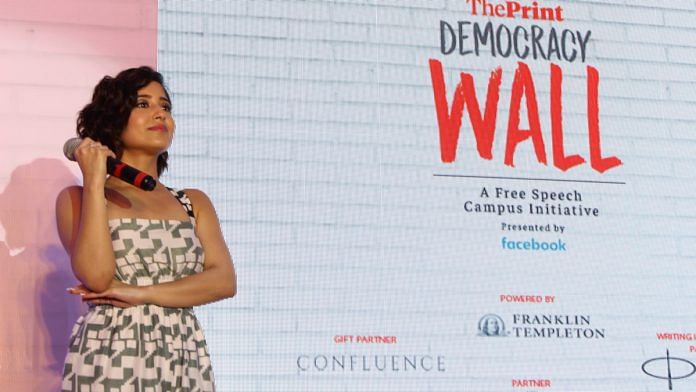New Delhi: Age-related discrimination, the pros and cons of making web series in India, censorship, and the dangers of having an opinion as a celebrity — these are just some of the topics that actor Shweta Tripathi opened up about at Hyderabad’s NALSAR University Friday.
Tripathi, along with politician Jaiveer Shergill and journalist Pamposh Raina, was part of ThePrint’s Democracy Wall — a free-speech campus initiative.
Widely known for her role in Masaan (2015), Tripathi has always been asked about the fact that she looks so much younger than her 34 years of age. Asked how she deals with getting younger roles, she said: “I’m happy, because for female actors, age defines a lot. Nobody tells you that it’s okay to be quirky or shy or different. They want all actors to be the same. But I take advantage of this, as I have a thought-process of an older person but look younger, so, I’m lucky.”
However, Tripathi was quick to point out that age has also been detrimental for her career, like most other female actors. “I have lost out on a lot of projects because of age. A lot of filmmakers, once they hear my real age, back out,” she said.
Indian web series
Tripathi, who was most recently seen in two of Amazon Prime’s top shows — Laakhon Mein Ek and Mirzapur, went on to talk about how the world of web series is changing Indian entertainment.
“As an actor, getting eight to 10 episodes to explore a character, it’s very satisfying. It’s very exciting. Plus, Bollywood heroes are these goodie-two-shoes who do no wrong. But in web series, everyone is grey. The characters are not perfect people, and that’s how it should be,” she said, taking the example of her own character from Laakhon Mein Ek, Dr Shreya Pathare.
“While accepting the role also, I told the director that Shreya has to be imperfect, have a lot of faults, because that’s when they (the characters) become relatable.”
Censorship
As talk of web series started, the next question, predictably, was on censorship, owing to recent protests against shows like Leila and Sacred Games.
While most actors choose to give diplomatic answers, Tripathi spoke her mind.
“In the earlier days, censorship was taken for granted. Most shows and films had very problematic and inappropriate humour, and they were never censored. But now, it’s the opposite,” she said.
“As an artiste, I’d never be for censorship, because I think that’s taking away our freedom of speech. Sure, as artistes we’re responsible for the projects we’re part of, but no to censorship.”
Celebrities’ political opinions
Keeping with the theme, Tripathi also spoke candidly about how celebrities are under intense pressure about the opinions they have on various political and non-political issues.
“Yes, it is important to have an opinion, but it’s okay to not have one on everything. Actors are also humans. I feel everyone should just go easy on each other,” she said.
Tripathi also said she tends not to look at her work through a political lens. “For me, it’s the story that I relate to. With Masaan, I didn’t think of it as a commentary on the caste system; with Haraamkhor, I didn’t think of it as a commentary on an inappropriate relationship. The stories just have to resonate with me,” she said.
“For Gone Kesh, which deals with alopecia, I don’t see it as a statement. If I like the story, I won’t shy away, even if it’s a small part.”
Tripathi signed off with a reminder to students that free speech is important, and that they have the power to make a difference.
Also read: It is up to actors to decide what issues they want to take stands on, says Nimrat Kaur



